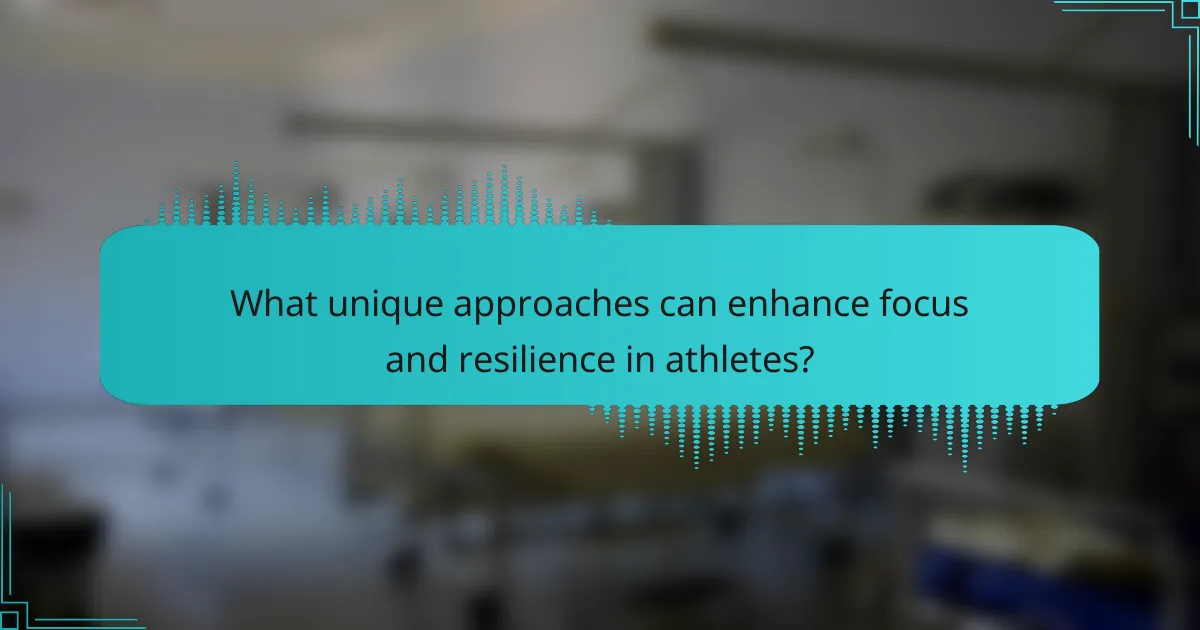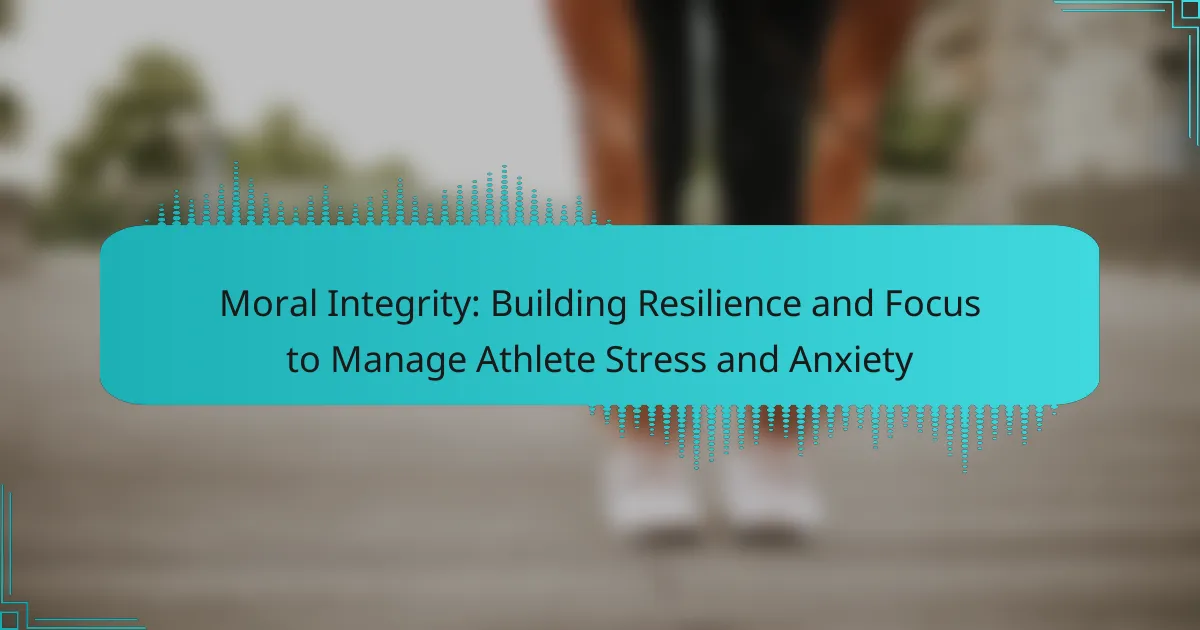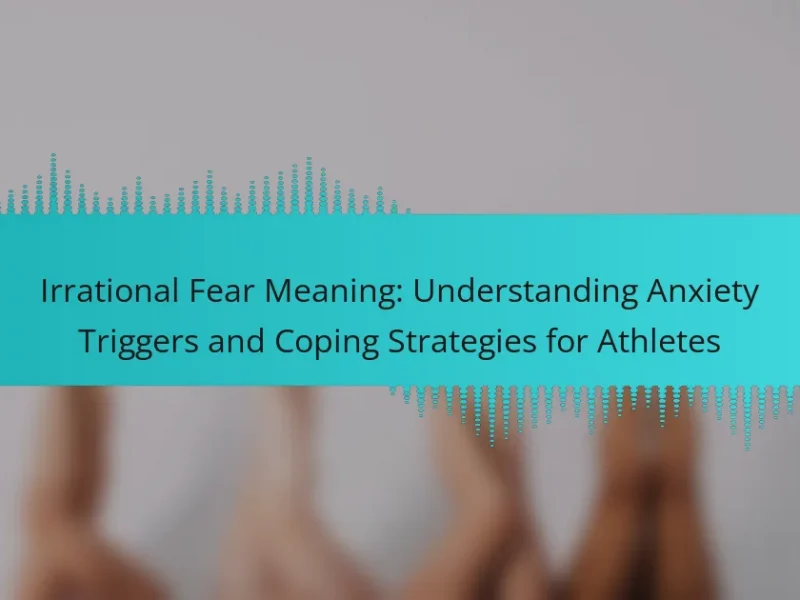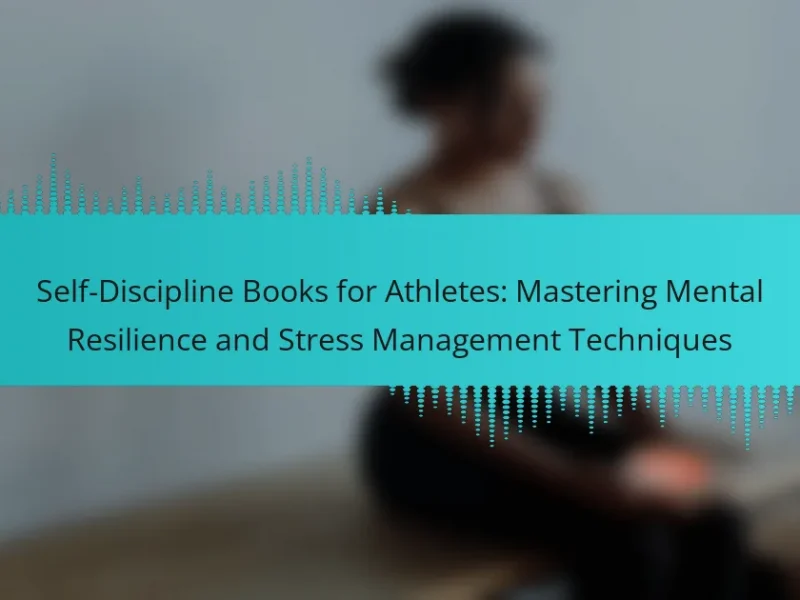Moral integrity is essential for athletes to manage stress and anxiety effectively. It fosters resilience and focus, encourages ethical decision-making, and enhances mental clarity. Athletes can adopt mindfulness practices, goal setting, and build strong support networks to navigate challenges. Recognizing common pitfalls in mental health strategies is crucial for developing a robust sense of moral integrity.

What is the role of moral integrity in managing stress and anxiety for athletes?
Moral integrity plays a crucial role in managing stress and anxiety for athletes by fostering resilience and focus. Athletes with strong moral principles often experience reduced pressure, as they align their actions with their values. This alignment enhances their mental clarity, allowing them to concentrate on performance rather than external judgments.
Furthermore, moral integrity encourages ethical decision-making, which can lead to a supportive team environment. This camaraderie reduces feelings of isolation, a common source of stress. Research indicates that athletes who prioritise integrity report higher levels of satisfaction and lower anxiety levels.
In addition, maintaining moral integrity can provide a sense of purpose, motivating athletes to push through challenges. When athletes view their efforts as part of a larger ethical framework, they are more likely to remain committed during stressful situations. This intrinsic motivation can be a powerful tool for managing anxiety effectively.
How does moral integrity contribute to resilience in athletes?
Moral integrity significantly enhances resilience in athletes by fostering a strong ethical foundation. This foundation enables athletes to navigate stress and anxiety effectively. Athletes with high moral integrity demonstrate commitment, accountability, and discipline, which are essential traits for overcoming challenges. Research indicates that athletes who adhere to moral principles are more likely to maintain focus under pressure, leading to improved performance outcomes. Furthermore, moral integrity cultivates a supportive environment, encouraging teamwork and mutual respect, which further bolsters resilience.
In what ways can athletes cultivate moral integrity?
Athletes can cultivate moral integrity through consistent self-reflection, accountability, and ethical decision-making. Engaging in regular discussions about values fosters a culture of integrity. Setting personal standards and adhering to them builds resilience against external pressures. Participating in community service enhances empathy, reinforcing ethical behaviour. Developing a support network encourages honest feedback, which further strengthens moral character.
What practices enhance ethical decision-making in sports?
Practices that enhance ethical decision-making in sports include fostering moral integrity, promoting open communication, and implementing structured decision-making frameworks. These approaches build resilience and focus, essential for managing athlete stress and anxiety.
Encouraging athletes to reflect on their values strengthens their moral compass. Open dialogue about ethical dilemmas creates a supportive environment where athletes can seek guidance. Structured decision-making frameworks provide clarity, helping athletes navigate complex situations effectively.
Research shows that athletes who engage in these practices exhibit higher levels of ethical behaviour, leading to a positive impact on team dynamics and overall performance. By prioritising moral integrity, sports organisations can cultivate a culture of ethical excellence.
How can athletes align their values with their goals?
Athletes can align their values with their goals by fostering moral integrity. This alignment builds resilience and focus, essential for managing stress and anxiety. When athletes prioritise their core values, they create a strong foundation for decision-making and performance. For example, an athlete who values teamwork will set goals that enhance collaboration, leading to improved outcomes. By consistently reflecting on their values, athletes can navigate challenges more effectively and maintain motivation. This approach not only enhances performance but also promotes mental well-being, allowing athletes to thrive under pressure.
What are the psychological benefits of maintaining moral integrity?
Maintaining moral integrity enhances psychological well-being by fostering resilience and focus. This integrity reduces stress and anxiety, enabling athletes to perform better under pressure. Studies show that individuals with strong moral values experience lower levels of anxiety and improved mental health. They develop a sense of purpose, which contributes to greater emotional stability and confidence. By adhering to ethical standards, athletes cultivate a positive self-image, reinforcing their ability to manage challenges effectively.

What universal strategies help athletes cope with stress and anxiety?
Moral integrity enhances resilience and focus, crucial for managing athlete stress and anxiety. Athletes can adopt strategies such as mindfulness, goal setting, and maintaining strong support systems. Mindfulness practices, like meditation, promote awareness and reduce anxiety. Goal setting provides direction and motivation, helping athletes stay focused during stressful times. Building a strong support network fosters emotional resilience, allowing athletes to share experiences and cope effectively. These strategies collectively empower athletes to navigate stress and anxiety while maintaining their moral integrity.
How can effective communication reduce athlete anxiety?
Effective communication significantly reduces athlete anxiety by fostering trust and clarity. Clear dialogue between coaches and athletes enhances understanding of expectations, which diminishes uncertainty. Additionally, open communication allows athletes to express concerns, leading to tailored support strategies. This proactive approach builds resilience and focus, essential for managing stress. Studies show that athletes who engage in regular feedback sessions report lower anxiety levels and improved performance.
What role does physical fitness play in stress management?
Physical fitness significantly enhances stress management by promoting resilience and focus in athletes. Regular exercise releases endorphins, reducing anxiety and improving mood. It also boosts self-confidence, enabling athletes to handle stressors more effectively. Furthermore, fitness routines create a structured environment, fostering discipline and mental clarity. This combination of physical and psychological benefits is crucial for managing athlete stress and anxiety.
How can time management techniques alleviate pressure on athletes?
Time management techniques significantly reduce pressure on athletes by enhancing their resilience and focus. Effective scheduling allows athletes to allocate time for training, recovery, and mental health, fostering a balanced approach. Prioritising tasks helps in minimising anxiety, as athletes can concentrate on immediate goals rather than overwhelming pressures. Techniques like setting specific deadlines and breaking tasks into manageable segments create a sense of control, which is crucial for maintaining moral integrity in high-stress environments. As a result, athletes can develop a stronger mindset, leading to improved performance and reduced stress levels.

What unique approaches can enhance focus and resilience in athletes?
Moral integrity enhances focus and resilience in athletes by fostering a strong sense of purpose. This approach encourages athletes to adhere to personal values, reducing stress and anxiety. Practicing self-reflection strengthens commitment to ethics, which can improve mental clarity. Engaging in team-building activities promotes trust and support, further enhancing resilience. Incorporating mindfulness techniques helps athletes stay present, improving focus during competitions.
How does visualization impact performance and reduce anxiety?
Visualization significantly enhances performance and reduces anxiety by fostering mental clarity and focus. Athletes who practice visualization techniques often report improved resilience against stressors. This method allows them to mentally rehearse scenarios, which can reduce uncertainty and anxiety. Research indicates that visualising success activates similar brain regions as actual performance, reinforcing confidence and reducing perceived stress levels. By integrating visualization into training, athletes can cultivate a strong mental framework that supports sustained focus and emotional stability during competitions.
What role does mentorship play in building resilience?
Mentorship plays a crucial role in building resilience by providing guidance and support. Mentors help athletes navigate stress and anxiety through shared experiences and strategies. They foster moral integrity, encouraging athletes to uphold values even under pressure. This relationship enhances focus and equips athletes with coping mechanisms, ultimately strengthening their mental fortitude.

What rare but effective techniques exist for stress management in athletes?
Moral integrity techniques enhance resilience and focus, effectively managing stress in athletes. Techniques such as mindfulness meditation, ethical decision-making frameworks, and visualization strategies cultivate mental fortitude. Mindfulness meditation reduces anxiety by promoting present-moment awareness. Ethical decision-making frameworks help athletes stay true to their values, fostering confidence and reducing stress. Visualization strategies allow athletes to mentally rehearse success, enhancing performance and focus under pressure. These rare techniques contribute significantly to an athlete’s ability to navigate stress and anxiety.
How can athletes leverage artistic expression as a coping mechanism?
Athletes can leverage artistic expression to cope with stress and anxiety by channeling emotions into creativity. Engaging in art forms, such as painting or music, fosters a sense of control and provides an emotional outlet. This unique attribute of artistic expression enhances resilience, allowing athletes to process experiences and reduce mental strain. As a result, integrating art into training routines can improve focus and overall mental well-being, supporting peak performance under pressure.
What unconventional therapies are emerging for athlete mental health?
Emerging unconventional therapies for athlete mental health include practices that enhance moral integrity, resilience, and focus. Techniques such as mindfulness meditation, art therapy, and nature immersion have shown promise in reducing stress and anxiety. Research indicates that mindfulness can improve emotional regulation and focus, benefiting athletic performance. Art therapy fosters self-expression, allowing athletes to process emotions creatively. Nature immersion, linked to reduced anxiety levels, helps athletes reconnect with their environment and themselves. These therapies collectively contribute to a holistic approach in managing mental health challenges in sports.

What are the common mistakes athletes make in managing stress and anxiety?
Athletes often mismanage stress and anxiety by neglecting mental health strategies, leading to decreased performance. Common mistakes include ignoring the importance of rest, underestimating the value of mental training, and failing to communicate feelings. Many athletes prioritise physical training over mental resilience, which can exacerbate stress. Additionally, a lack of coping mechanisms, such as mindfulness and visualization, can prevent effective stress management. Recognising these pitfalls is crucial for developing moral integrity and building resilience.
How can athletes avoid burnout while pursuing excellence?
Athletes can avoid burnout by prioritising moral integrity, which fosters resilience and focus. Establishing clear values helps athletes manage stress and anxiety effectively. Regular self-reflection and maintaining a balanced lifestyle are critical. Incorporating mindfulness practices can enhance mental clarity and emotional stability, reducing the risk of burnout.
What strategies can help prevent negative self-talk?
Practicing self-compassion and mindfulness can effectively prevent negative self-talk. Strategies include identifying triggers, reframing negative thoughts, and using positive affirmations. Engaging in physical activity and seeking social support also enhances resilience. These methods promote moral integrity, helping athletes manage stress and anxiety effectively.

What best practices can athletes implement for immediate stress relief?
Athletes can implement several best practices for immediate stress relief. Deep breathing exercises help calm the mind and body, while progressive muscle relaxation reduces tension. Visualization techniques allow athletes to mentally rehearse success, enhancing focus. Engaging in physical activity, even briefly, releases endorphins, improving mood. Mindfulness meditation fosters present-moment awareness, reducing anxiety. Lastly, maintaining a supportive social network provides emotional resilience.
How can breathing exercises enhance focus and calmness?
Breathing exercises enhance focus and calmness by reducing stress and promoting mental clarity. These practices activate the parasympathetic nervous system, leading to relaxation and improved concentration. Regular engagement in deep breathing techniques can lower anxiety levels, making it easier for athletes to manage stress effectively. Studies show that athletes who incorporate breathing exercises report heightened resilience and better performance under pressure.
What daily routines support mental well-being for athletes?
Daily routines that support mental well-being for athletes include mindfulness practices, structured training schedules, and adequate rest. These routines build resilience and focus, essential for managing stress and anxiety.
Mindfulness practices, such as meditation and deep-breathing exercises, enhance self-awareness and emotional regulation. Structured training schedules provide a balance between physical exertion and recovery, reducing burnout. Adequate rest, including quality sleep, is crucial for cognitive function and overall mental health.
Engaging in social interactions with teammates fosters a supportive environment, enhancing feelings of belonging. Nutrition also plays a vital role; a balanced diet supports both physical and mental health, contributing to improved performance and reduced anxiety.
Incorporating these routines can lead to better mental resilience, enabling athletes to handle the pressures of competition more effectively.
How can athletes create a supportive environment to thrive?
Athletes can create a supportive environment by fostering trust, open communication, and shared goals. Moral integrity enhances resilience and focus, enabling athletes to manage stress and anxiety effectively.
Building a culture of respect encourages team members to support one another. Regular check-ins and feedback sessions promote transparency and collaboration. Establishing common objectives aligns efforts and strengthens bonds among athletes.
Encouraging positive reinforcement helps to cultivate a motivating atmosphere. Recognising individual and team achievements boosts morale and fosters commitment. This supportive environment ultimately enhances performance and well-being, crucial for managing athlete stress and anxiety.


